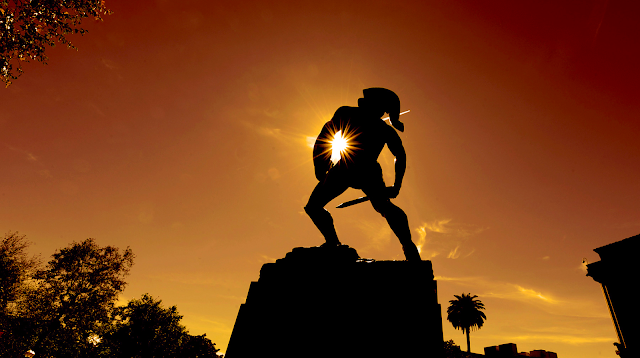TL;DR
- Jupiter the punching bag
- Dark matter tipping the galactic scales
- When the Sun tanks the stock market
Current events
I've tried my hand at astrophotography, but I swear I have the worst luck - every time I try capture an eclipse (solar or lunar), it's always cloudy! But one amateur astronomer, Ethan Chappel, caught the sight of a lifetime - he pointed his telescope at Jupiter on August 7, 2019 just as a meteor crashed into the gigantic planet's upper atmosphere and exploded. Talk about right place, right time!
 |
| "To get a video like that, I've never seen anything like that before. That's just totally breathtaking" - Astronomer Jonti Horner, University of Southern Queensland | Credit: @chappel_astro |
While actually witnessing this cosmic event requires a great deal of serendipity, the combination of Jupiter's immense gravity and its proximity to the Asteroid Belt means it takes quite a pummeling from menacing space rocks. And we may be all the better for it - scientists hypothesize Jupiter acts as a monstrous shield for us puny Earthlings, luring asteroids away from potentially extinction-level impacts on our planet
 |
| If Shoemaker-Levy were headed for Earth, I doubt Bruce Willis and his merry band of astronaut-oil drillers could've saved us |
All things considered, last week's meteor was still pretty small; the most epic Jupiter impact we've ever witnessed was Comet Shoemaker-Levy 9 in 1994. After being captured by Jupiter's gravity, Jupiter's massive tidal forces ripped the comet apart into 21 fragments that successively slammed into Jupiter's southern hemisphere at over 134,000 mph, leaving dark brown splotches that scarred Jupiter's surface for months afterwards. The astronomy community at the time was of course ecstatic to see such a cataclysmic astronomical phenomenon, but as for me, all I have to say is better Jupiter that us! Check out this video to imagine a Shoemaker-Levy Earth impact
Today I learned
There are a number of fascinating unsolved problems in astrophysics and cosmology (check out my list here!), but physicists at Johns Hopkins may have found a clue to one of them. Here's the problem - the Universe was born from the Big Bang as a super-heated ball of pure energy, from which matter gradually condensed out of as the Universe expanded and cooled. In this model, matter should be perfectly distributed evenly throughout the cosmos. So why isn't the Universe just a homogeneous sea of quarks and leptons? Why the dense, lumpy patches of matter (like galaxies, planets, and human beings) interspersed by vast voids of absolutely nothing? |
| Digital simulation showing the large-scale distribution of matter, with filaments and knots representing high density areas | Credit: University of Geneva |
The new mathematical model suggests it's possible that particles of dark matter (whatever they may be) somehow existed before the Big Bang, and that their presence interacted with the Higgs Field to influence the distribution of matter after the Big Bang occurred. Once the tiniest imbalance in matter distribution manifested, gravitational attraction took over and led to the celestial bodies we observe today
So where to from here? It's hard to say, but our best telescopes are constantly scanning the skies trying to determine the nature of dark matter. I'm sure we'll need some real-life observations before we can prove anything for sure!
More on the Higgs Field here, if you're curious!
This week in space history
I live at the intersection of space and finance, but I think we all know if the two were ever pitted against each other, finance doesn't stand a chance against cosmic forces. On August 16, 1989, a massive solar storm knocked out computers at the Toronto Stock Exchange and forced a 3-hour halt on trading! (article here) |
| "I don't know what the gods were doing to us" - John Kane, vice president of the Toronto Stock Exchange |
Solar flares launch charged particles that disrupt radio communication and damage electronics, and they're especially common when the Sun is at the peak of its regular 11-year solar cycle. Right now, 2019 is at the minimum of the current cycle. Bummer for me, if the Sun shut down the NYSE, maybe I wouldn't have to update stock price charts at work anymore!



No comments